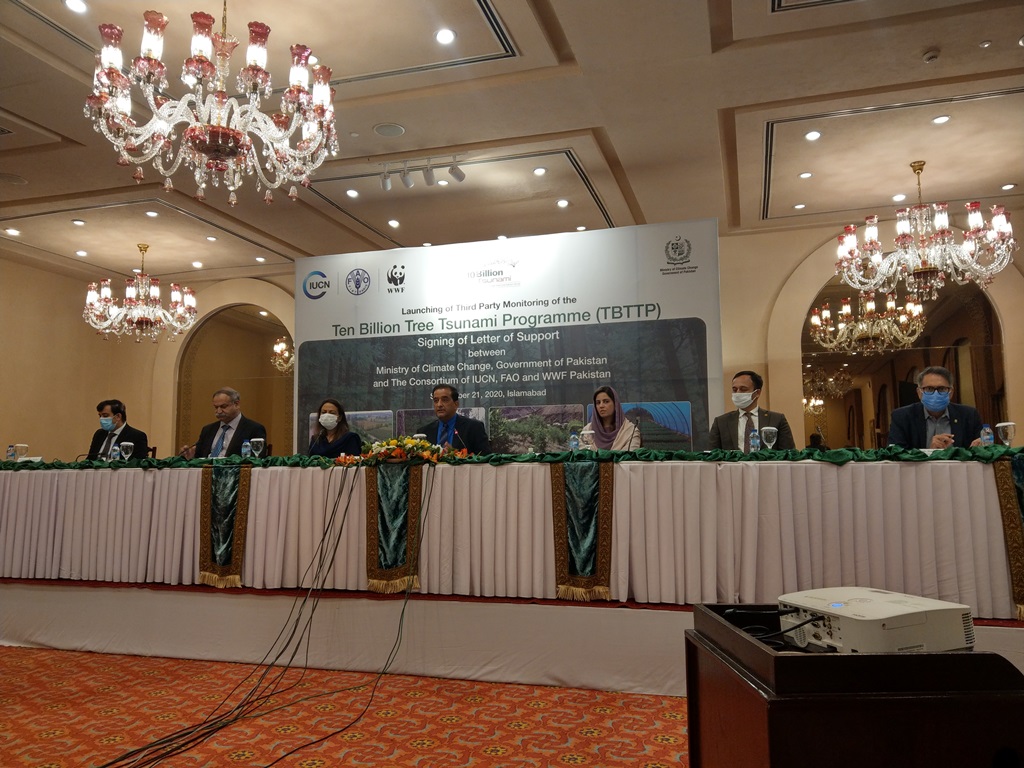Climate change threat greater than great wars

Photo: IUCN Pakistan
Crops failure and loss of livestock will lead to food insecurity and serious conflicts on resources
Lahore, August 30, 2008 (IUCN) – A seminar titled “Impacts of Climate Change on Agriculture in Punjab” was organized under the auspices of Pakistan’s Technical Advisory Panel on Climate Change in collaboration with the City District Government Lahore.
The purpose of the seminar was to seed the debate on climate change issues in Pakistan in general, and in the agriculture sector in particular, and on measures necessary towards addressing these impacts in the province. It was also meant to raise awareness of relevant stakeholders, particularly senior decision-makers in the Government of Punjab.
The seminar was attended by a large number of organizations including heads and representatives of various government departments, subject specialists, researchers, representatives of civil society organizations, corporate sector, academia and media.
Welcoming the participants, Mr. Sajjad Bhutta, District Coordination Officer, City Government Lahore said that currently there is no climate change related initiative in the Punjab province. He hoped that based on the recommendations of this seminar, a provincial initiative can be launched soon. He also mentioned that Lahore’s Clean Air Commission is on its way to implement clean air program to reduce air pollution in Lahore.
In his keynote speech, Dr. Amir Muhammad, a renowned Climate Change expert, gave an overview of the impacts of climate change in Pakistan. He informed that eleven of the last twelve years (1995-2006) rank among the twelve warmest years since 1850. Glaciers and snow cover is declining and heat waves have become more frequent over most land areas.
Highlighting some of the main concerns, he said that water management in the agriculture sector is poor and for future we should focus on developing modalities for water storage. He also called for the agri-scientists to develop crop varieties and introduce animal breeds adapted to changing climatic conditions.
In her remarks, Ms. Nikhat Sattar, Head IUCN Country Group II (Pakistan and Nepal) noted that the South Asian region, particularly countries like Pakistan, Bangladesh, Sri Lanka, Nepal and Bhutan are very vulnerable to the impacts of climate change. These impacts are likely to affect the agriculture, forestry and water resources of the region as well as human settlements, energy use and industrial growth. She mentioned that climate change is a cross cutting issue and can not be addressed in isolation. She proposed the development of a comprehensive plan of action comprising the following:
- A coordinated and prioritized research program such that the research findings feed directly into policy;
- Comprehensive review of all policies to assess how climate change can be integrated;
- Assessment of climate change impacts on ecosystem goods and services;
- Awareness and capacity building initiatives; and
- Adequate resource allocation for the above.
The Chief Guest on the occasion, Mr. Hameed Ullah Jan Afridi, Federal Minister for Environment agreed that the climate change will worsen the living conditions of millions of farmers, fisher folk and forest dependent communities. Crop failure and loss of livestock will lead to food insecurity. This will essentially threaten serious conflicts over resources.
Mr. Afridi said that the Government of Pakistan is cognizant of the seriousness of the issue and is working on a war footing to mitigate the negative impacts and adapt to the realities of this phenomenon. He emphasized that the government is working to ensure cross-sectoral integration of climate change aspects in national policies and plans. He called for assistance by IUCN and other organizations to help the government develop robust adaptation strategies so that negative impacts of climate change can be minimized. He expressed his commitment to meet national and international obligations for combating climate change.
In the technical session, experts elaborated on the impacts of climate change. The discussion also focused on the possible opportunities for the sector and how these may be harnessed to improve agricultural productivity in the country. The technical session resulted in several concrete recommendations for action including the development of a comprehensive climate change strategy for Pakistan.
For more information, please contact:
Ahmad Saeed
Principle Expert Global Change
House 9, Street 64, F- 8/4
Islamabad
Tel: + 92 51 2850250
email: ahmad.saeed@iucnp.org
About IUCN (International Union for Conservation of Nature)
Created in 1948, IUCN brings together 83 States, 111 government agencies, 800 plus NGOs, and some 10,000 scientists and experts from 148 countries in a unique worldwide partnership. The Union’s mission is to influence, encourage and assist societies throughout the world to conserve the integrity and diversity of nature and to ensure that any use of natural resources is equitable and ecologically sustainable.
The Union is the world's largest environmental knowledge network and has helped over 75 countries to prepare and implement national conservation and biodiversity strategies. The Union is a multicultural, multilingual organization with 1,000 staff located in 62 countries. Its headquarters are in Gland, Switzerland.
More information can be found at https://www.iucn.org/.
IUCN Pakistan has programmes from the north to the south of the country and multiple field projects. It is one of the nine Country Offices of IUCN's Asia Programme, covering 23 countries with a workforce of nearly 500.
More information can be found at www.iucn.org



